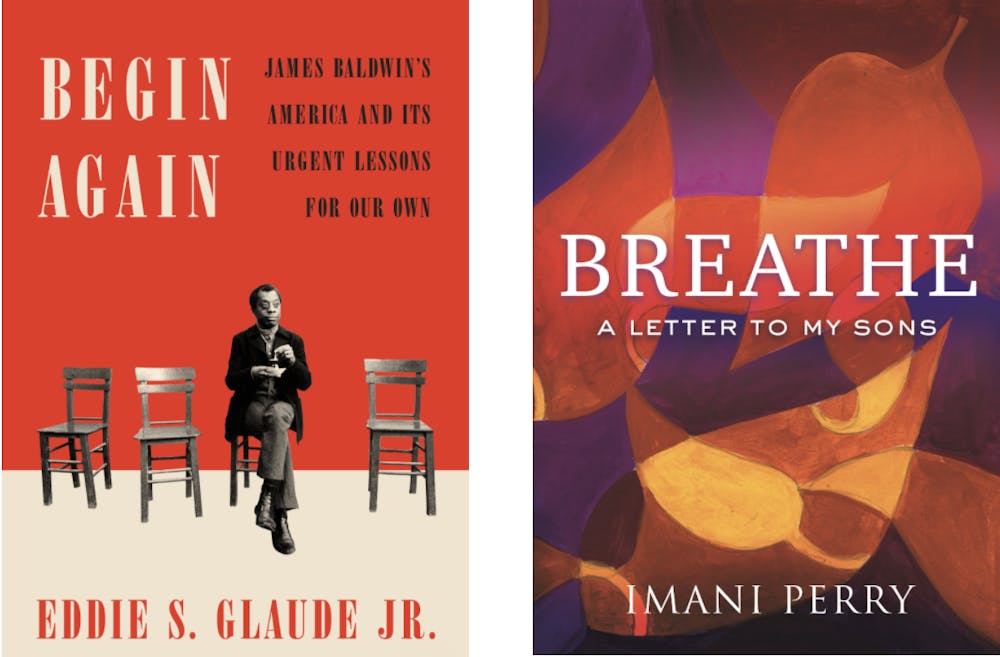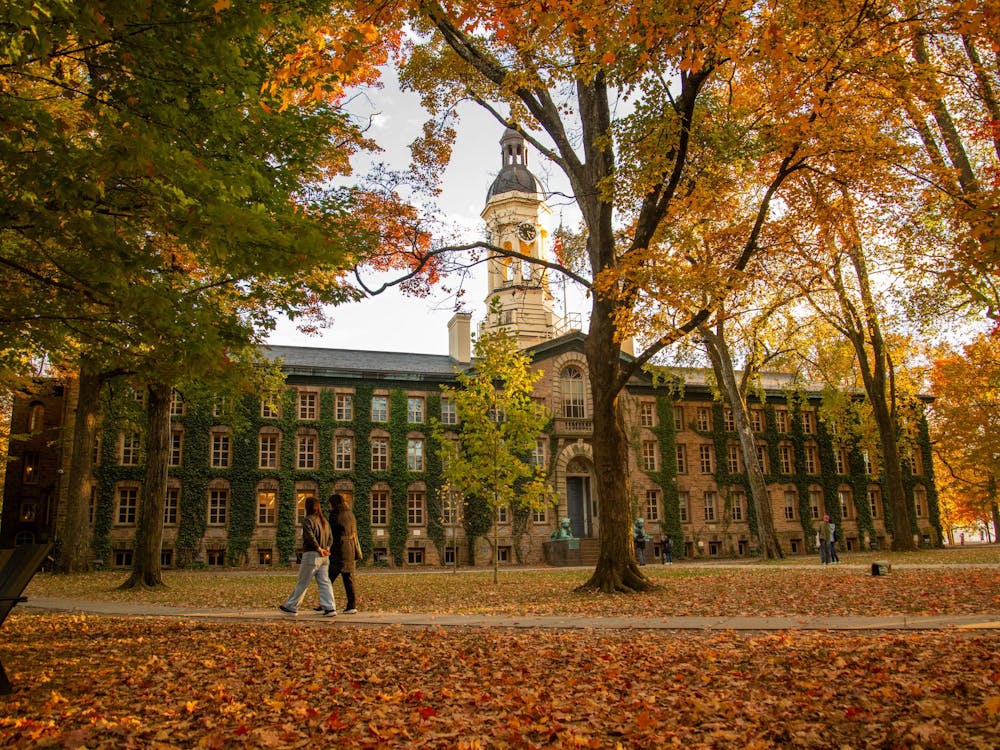Last week, over 140 students and community members attended a virtual book talk with University professors Imani Perry and Eddie S. Glaude, Jr. GS ’97.
In response to the nationwide reckoning with racial injustice, the Undergraduate Student Government (USG) launched an anti-racist book initiative, providing anti-racist literature to almost 1300 students. Each undergraduate was offered a free digital copy of Perry’s “Breathe: A Letter to My Sons” or Glaude’s “Begin Again: James Baldwin’s America and its Urgent Lessons for Our Own.” The initiative culminated in the book talk with Perry and Glaude.
Perry is the Hughes-Rogers Professor of African American Studies (AAS), and Glaude is the James S. McDonnell Distinguished University Professor and Chair of AAS.
In their Aug. 25 talk, Glaude and Perry covered several themes: the importance of personal conviction and experience, the simultaneity of progress and regression in racial justice, and the need for Americans to tell the truth about their nation’s history.
Glaude emphasized the continued need for structural change across the United States, and suggested that the University must do more, beyond its removal of Woodrow Wilson’s name from the School of Public and International Affairs.
“It’s one thing … to take down Woodrow Wilson’s name and pat yourself on the back, but the structures of inequality, the structures of an ideology that have defined the institution since its formation still remain in place,” he said.
Fighting racism and white supremacy
Both authors recalled that writing their books allowed them to explore what it means to be Black in America. Perry told attendees that her life as a Black woman is filled with joy and that she guides her life to find meaning and beauty.

She said, however, “the existence of joy must always coexist with the reality of racism and white supremacy.”
“There’s a way of thinking about what we tried to do in each of these books as tragically evergreen,” Perry said, “in the sense that they are both in distinct fashions, a confrontation with the tight connection between what it means to live as a Black person in the United States, and the encounter with either death or the prospect of death, or the violence of racism.”
Given a finite amount of energy, Glaude and Perry said, people must seek out those who allow them to feel safe and loved in order to combat racism.
Perry explained that she struggles with “the fact that this seems like an unmovable mountain” and “the reality that we have no choice but to hope.”

Both authors’ books document the struggle between stagnation and progress.
Perry pointed to Glaude’s discussion of Baldwin’s writings on the 1970s and ’80s, when white resistance to the civil rights movement culminated in the election of Ronald Reagan, even as a record number of Black politicians entered elected office and the Black middle class grew. In some ways, she said, Black people were making strides to equality, but they were met with resistance.
Perry noted that such examples reveal “the simultaneity of moments of mobilization and moments of destruction.”
According to Perry and Glaude, many Americans refuse to recognize such historical and contemporary coincidences; rather than acknowledging simultaneous progress and destruction, they tend to focus on progress and then backlash.
Yet, Perry argued these forces are often present simultaneously.
As an example, she explained that recent events have contradicted calls for racial justice, even as those demands resonate globally. Glaude and Perry shared the rage and pain they experienced a day after Jacob Blake, a Black man, was shot by a police officer seven times in front of his children in Kenosha, Wis.
“The entire world is saying, ‘Black Lives Matter,’” Perry said. “And this is still happening in broad daylight, this trauma for these children, this trauma for this man, this trauma for a people, for communities.”
Glaude, however, expressed hope in the fact that Black Lives Matter organizing work has never stopped, even after cameras have turned away.
“In such a moment where 180,000 of our fellows have succumbed to the virus and Black folk are dying at two and a half times the rate of white folk and thinking about how native peoples are being ravaged by the virus … how do we find the courage to do that work of seriously interrogating the scaffolding of lies that hold us up?” Glaude said.
Referring to the first night of President Donald Trump’s Republican National Convention, he added, “Last night I mean, it was three hours of just historical Black gaslighting.”
Racial Justice on campus and afar
Both professors said that work for racial justice must continue. Perry emphasized that the Democratic party should not take Black voters for granted without meeting their needs, and Glaude emphasized that symbolic changes, such as the University’s removal of Woodrow Wilson’s name, must precipitate meaningful change.
“We tend to want to overstate the initial gesture. And then we stay there,” he said. “So what we will make of it, I’m not sure. But history suggests we’re not going to make much of it.”
Assistant Dean of Undergraduate Students and Director of Student Leadership and Engagement Ian Deas explained that the book initiative came in a response to student demands for anti-racist action beyond renaming institutions.
“It was clear, as we looked across the nation, and looked within the gates that people really wanted some action from the University. So the USG developed this as a way to respond, and they did it in consultation with students who are concentrators in the African American Studies Department,” he said.
Reception and further conversations
USG teamed up with the Office of the Dean of Undergraduate Students (ODUS), the Office of Wintersession and Campus Engagement, and the Campus Conversations on Identities Initiative to distribute the books and organize the discussion. Vice President for Campus Life Rochelle Calhoun promoted the initiative to staff.
Kavya Chaturvedi ’21, a moderator, told The Daily Princetonian she was pleased with the conversation and grateful to Perry and Glaude for giving students hope.
“I feel so lucky and inspired that we were all able to listen in to this candid conversation between two brilliant academics … about how far our country still has to go on issues of racial justice, especially in light of so many acts of racial violence we have seen this summer, while still remaining hopeful about future progress,” she wrote in an email to the ‘Prince.’
USG’s announcement email included a list of fall courses that concern race and identity, compiled by Taylor Jean-Jacques ’20. The email also featured an anti-racist reading list created by Ashley Hodges ’21 and Lauren Johnson ’21.
Jean-Jacques is a former Business Manager of the ‘Prince.’
“Racism and inequality in this country are both systemic and ongoing. We think ongoing problems require ongoing engagement, so we didn't want the book discussion itself to be a one-off event or program,” Deas said in an interview with the ‘Prince.’
ODUS will continue anti-racist conversations with monthly discussions. The next is scheduled for Sept. 24 and will feature Morgan Jerkins ’14, Rakesh Satyal ’02, and Professor Tracy K. Smith, Chair of the University’s Lewis Center for the Arts and former U.S. Poet Laureate.








